External links
- Lyrics & download of "Arkansas", from the Arkansas Secretary of State's website
- Arkansas Code (Section 1-4-116, State songs and anthem)
"Arkansas", written by Eva Ware Barnett in 1916, is one of the official state songs of Arkansas. It was first adopted as the state song in the early 20th century but was removed in 1949 due to a copyright dispute. After the state settled the dispute by buying all claims to its copyright, it was restored as state song in 1963.
In 1987, the General Assembly elevated the song to "state anthem" in order to designate "Arkansas (You Run Deep In Me)" and "Oh, Arkansas", both written for the state's 150th birthday in 1986, as state songs; it also designated "The Arkansas Traveler", the state song from 1949 to 1963, as "state historical song".
Another 1987 law requires the Secretary of State to respond to all requests for copies of the "state song" with this song. However, this was done only to preserve the historical status of this song; all four songs are either copyrighted by the state itself or in the public domain. Today, the Secretary of State posts the lyrics to all four songs on its website.
An anthem is a musical composition of celebration, usually used as a symbol for a distinct group, particularly the national anthems of countries. Originally, and in music theory and religious contexts, it also refers more particularly to short sacred choral work and still more particularly to a specific form of liturgical music. In this sense, its use began ca. 1550 in English-speaking churches; it uses English language words, in contrast to the originally Roman Catholic 'motet' which sets a Latin text.

"Happy Birthday to You", also known as "Happy Birthday", is a song traditionally sung to celebrate a person's birthday. According to the 1998 Guinness World Records, it is the most recognised song in the English language, followed by "For He's a Jolly Good Fellow". The song's base lyrics have been translated into at least 18 languages. The melody of "Happy Birthday to You" comes from the song "Good Morning to All", which has traditionally been attributed to American sisters Patty and Mildred J. Hill in 1893, although the claim that the sisters composed the tune is disputed.
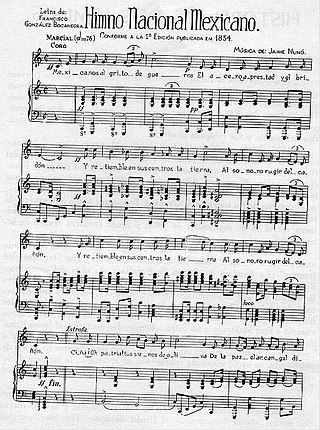
The "Mexican National Anthem", also known by its incipit "Mexicans, at the cry of war", is the national anthem of Mexico. The anthem was first used in 1854. The lyrics of the national anthem, which allude to historical Mexican military victories in the heat of battle and including cries of defending the homeland, were composed by poet Francisco González Bocanegra after a Federal contest in 1853. Later, in 1854, he asked Jaime Nunó to compose the music that now accompanies González's poem. The national anthem, consisting of ten stanzas and a chorus, effectively entered into use on September 16, 1854.
A national anthem is a patriotic musical composition symbolizing and evoking eulogies of the history and traditions of a country or nation. The majority of national anthems are marches or hymns in style. American, Central Asian, and European nations tend towards more ornate and operatic pieces, while those in the Middle East, Oceania, Africa, and the Caribbean use a more simplistic fanfare. Some countries that are devolved into multiple constituent states have their own official musical compositions for them ; their constituencies' songs are sometimes referred to as national anthems even though they are not sovereign states.

"Aegukga", often translated as "The Patriotic Song", is the national anthem of the Republic of Korea. It was adopted in 1948, the year the country was founded. Its music was composed in the 1930s and arranged most recently in 2018; its lyrics date back to the 1890s. The lyrics of "Aegukga" were originally set to the music of the Scottish song "Auld Lang Syne" before Ahn Eak-tai composed a unique melody specifically for it in 1936. Before the founding of South Korea, the song's lyrics, set to the music of "Auld Lang Syne", was sung, as well as during Korea under Japanese rule by dissidents. The version set to the melody composed by Ahn Eak-tai was adopted as the national anthem of the Korean exile government, which existed during Korea's occupation by Japan from the early 1910s to the mid-1940s.
"Tiến Quân Ca", known in English as the "Marching Song", "Song of a Marching Army" or "Song of Advancing Soldiers", is the national anthem of Vietnam, written and composed by Văn Cao in 1944. The "Army Marching Song" was adopted as the national anthem of North Vietnam in 1954 and was adopted as the national anthem of the new unified Socialist Republic of Vietnam in 1976, following the reunification of North Vietnam and South Vietnam at the end of the Vietnam War. Though it has two verses, only the first one is usually sung, like the Star-Spangled Banner.
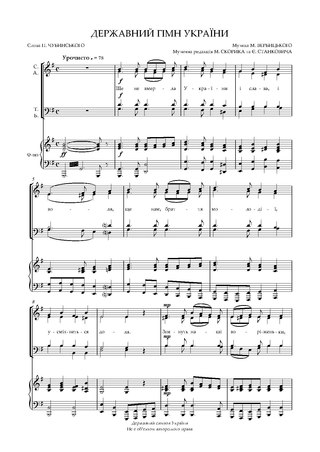
"Shche ne vmerla Ukrainy i slava, i volia", also known by its official title of "State Anthem of Ukraine" or by its shortened form "Shche ne vmerla Ukrayina", is the national anthem of Ukraine. It is one of the state symbols of the country.
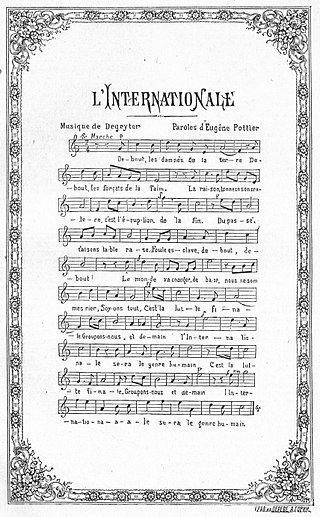
"The Internationale" is a left-wing anthem. It has been a standard of the socialist movement since the late nineteenth century, when the Second International adopted it as its official anthem. The title arises from the "First International", an alliance of workers which held a congress in 1864. The author of the anthem's lyrics, Eugène Pottier, an anarchist, attended this congress. Pottier's text was later set to an original melody composed by Pierre De Geyter, a Marxist.
Arkansas is a Southern state of the United States. Arkansas's musical heritage includes country music and various related styles like bluegrass and rockabilly.
"Illinois" is the regional anthem of the U.S. state of Illinois. Written in the early 1890s by Civil War veteran Charles H. Chamberlain, the verses were set to the tune of "Baby Mine," a popular song composed in 1870 by Archibald Johnston. "Illinois" became the state song by an act of the 54th Illinois General Assembly in 1925.

"Washington, My Home" is the state song of Washington, in the United States. It was composed in 1951 by Helen Davis and set to music by Stuart Churchill under the name "America, My Home". Subsequently, retitled and rewritten as "Washington, My Home", it was made the state song in 1959 by an act of the Washington State Legislature. An earlier anthem, "Washington Beloved", was declared the state song in 1909 by a ceremonial resolution of the state legislature.
"Oh, Arkansas" by Terry Rose and Gary Klaff is one of the official state songs of Arkansas. It was written in 1986 for the state's 150th-anniversary celebration and was named an official "state song" by the Arkansas General Assembly in 1987.
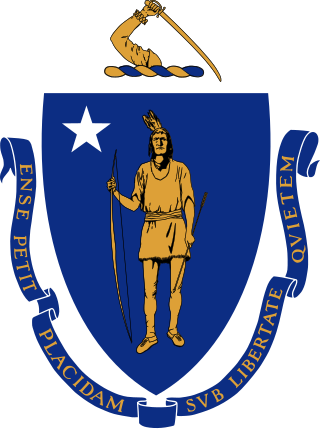
"All Hail to Massachusetts", with words and music by Arthur James Marsh, was made the official state song of Massachusetts on September 3, 1966, and codified by an act of the General Court in 1966. The song, written originally in the Spring of 1954 by Marsh, a Wellesley music teacher who intended to make it an official anthem, was first performed on August 15, 1954, at the bandstand of Paragon Park, Nantasket Beach in Hull. Following three previous attempts by the legislature to designate a state song in 1958, 1961, and 1964, the song was selected as the state song in June 1966. The final commission which picked the tune was chaired by Arthur Fiedler, conductor of the Boston Pops, along with Erich Leinsdorf, with the support of fellow Boston Pops musicians Harry Ellis Dickson and Leo Litwin, and Peter Siragusa, then-director of music for Boston Public Schools. The commission's legislators were state senator James A. Kelly Jr., as well as representatives David M. Bartley and John M. Melia. With its enactment as the state song, it entered the public domain, with the act including a "properly executed transfer of the copyright to said song to the commonwealth."

"The Arkansas Traveler" is a mid-19th century folk song popularized by American singer and guitarist Mose Case. It is based on the composition of the same name by Sandford C. Faulkner. The score was first published by W. C. Peters in 1847 under the name "The Arkansas Traveller and Rackinsac Waltz".
"Arkansas " by Wayland Holyfield is one of the official state songs of Arkansas. It was written by Holyfield in 1986 for the state's 150th-anniversary celebration and was named an official "state song" by the Arkansas General Assembly in 1987. Holyfield played the song at the inauguration of President Bill Clinton in 1993.
"Go, Mississippi" is the regional anthem of Mississippi, adopted as the official state song on May 17, 1962.
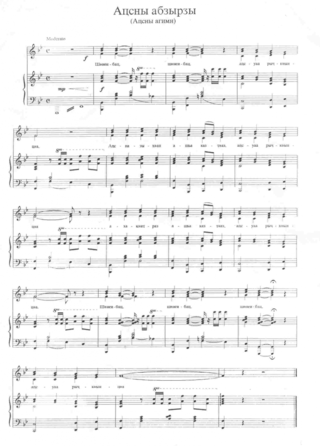
"Aiaaira" is the national anthem of the partially recognized state of Abkhazia. It was adopted in 1992. The lyrics were written by poet Gennady Alamia, and the music was composed by Valery Chkadua.

"Amhrán na bhFiann", called "The Soldier's Song" in English, is Ireland's national anthem. The music was composed by Peadar Kearney and Patrick Heeney, the original English lyrics by Kearney, and the Irish-language translation, now usually the version heard, by Liam Ó Rinn. The song has three verses, but only the choral refrain is used as the national anthem.
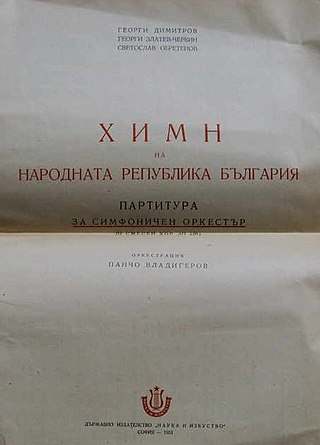
Anthem of the Bulgarian People's Republic, also unofficially known as Dear Bulgaria was the national anthem of Bulgaria from 1951 until 1964.